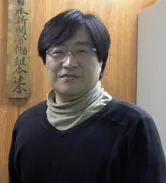Katsuya Fujimoto and Shuichi Yutaka, the general secretary and the president of Shinbun Roren, the Japan Federation of Newspaper Workers’ Unions, sit at a table in their office in Tokyo’s Bunkyo-ku district amid a pile of papers. A software engineer with a media company and a journalist, each on two years’ leave, they are shuffling through documents showing their organization’s efforts to reform the Kisha Club system I wrote about yesterday.
They say they are optimistic about improving access to press conferences for journalists who are not members of the exclusive clubs, which give print and broadcast journalists exclusive access to press conferences and high-level anonymous sources. The union formally requested such access in 1994 and 2002, to no avail. Freelance, Internet and foreign reporters are frequently excluded. But on February 9, they say, in a little-reported weekly press conference, Minister for Internal Affairs and Communications, Kazuhiro Haraguchi—who has already made his own ministry’s press club open its doors—told journalists he planned to investigate the openness of press conferences in all government ministries, including the prosecutor’s office.
• 日本語版
That development marks a small step toward meeting promises made by the Democratic Party of Japan in the run-up to the 2009 election, when they defeated the long-ruling Liberal Democratic Party. Ironically, Fujimoto says, pressure on the government to fulfill that pledge has grown because of a news storm surrounding Japanese prosecutors’ investigation of the party’s secretary-general, Ichiro Ozawa, for alleged corruption.
Another issue the unions grapple with is physical stress. Working long hours is so embedded in the industry culture that death from overwork, with symptoms including heart attacks or brain aneurysm, is a source of real concern in Japan. The country’s multiple newspaper and broadcast unions, which are attached to different media groups, don’t have to deal with threats or attacks on their members, Fujimoto explains, and even bureaucratic barriers show signs of breaking down. But they do have to worry about colleagues dying on the job, he said.
